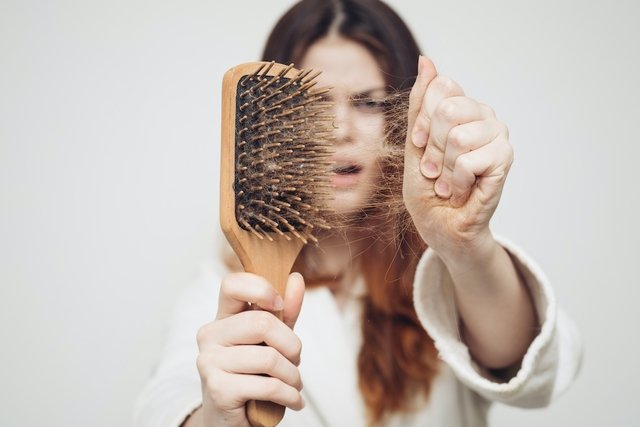Excessive hair loss can happen as a result of hormonal changes, menopause or andropause, stress, a diet poor in nutrients and vitamins or anemia, for example.
Furthermore, hair falling out a lot can also happen postpartum, which is considered normal due to hormonal changes, and can also happen due to a fungal infection on the scalp or the use of medicines, especially those used to treat cancer. .
It is recommended to consult a dermatologist to identify the cause and guide the treatment of hair loss, which can be done with food, medicine, nutritional supplements, shampoos, or even aesthetic techniques, such as carboxytherapy, or surgical techniques, such as implants or transplants. capillary. Find out how a hair transplant is performed.

The main causes of hair falling out a lot are:
1. Diet poor in nutrients and vitamins
A diet poor in nutrients, vitamins and minerals, such as proteins, zinc, iron and vitamins A and C, can be a cause of hair loss. This occurs because these nutrients help with hair growth and strengthening, therefore, a diet low in these nutrients favors hair loss.
What to do: You must eat a balanced and nutritious diet rich in proteins, iron, zinc and vitamins, such as lean meat, cheese, milk, fruits, vegetables and fresh vegetables, according to the nutritionist’s guidance. Furthermore, it may be necessary to use dietary supplements, which must be recommended by a doctor or nutritionist. Learn more about nutrition for hair loss.
2. Excessive stress and anxiety
Excess stress and anxiety can cause a hormonal imbalance of cortisol, a hormone related to stress, which when levels are increased can cause excessive hair loss, with an increase in the number of strands that fall out per day. This occurs due to a condition called telogen effluvium characterized by widespread hair loss on the scalp and interruption of hair growth. Learn more about telogen effluvium.
Furthermore, stress and anxiety can affect digestion and absorption of nutrients in the body, causing an imbalance of vitamins and nutrients essential for hair growth and strengthening, causing hair to fall out.
What to do: It is important to identify the cause of stress, for example, work, studies or family problems, in addition to seeking activities that give pleasure such as meeting friends, exercising and developing a hobby, such as photography or sewing, for example. Monitoring with a psychologist helps to seek self-knowledge and develop emotional balance, relieving stress. See other strategies to combat stress.
3. COVID-19
Some people diagnosed with COVID-19 may experience increased hair loss a few weeks after infection with SARS-CoV-2, which may last between 6 and 9 months. Some studies indicate that this drop is related to the increase in pro-inflammatory cytokines due to the infection, however it is more likely to be a consequence of the stress, anxiety and/or fever that may be present at that time.
What to do: In most cases, hair loss resulting from COVID-19 resolves between 6 and 9 months after infection, without the need for treatment. Furthermore, at the same time that strands fall out, other strands grow, so it is common to notice smaller strands on the scalp.
Although it is a situation that does not require treatment, it is recommended that a dermatologist be consulted so that an assessment can be made of the scalp and the person’s general health status and, thus, confirm the cause and assess the need for treatment to accelerate hair growth and/or prevent hair loss.
4. Menopause or andropause
Menopause, which is the interruption of menstruation due to a natural aging process in women in which the ovaries stop producing estrogen, or andropause, which is the male menopause in which the testicles decrease the production of testosterone, causes a hormonal change that can cause hair to fall out more frequently.
What to do: You should consult a gynecologist, in the case of women, or an endocrinologist, in the case of men, to assess the need for hormone replacement and thus prevent hair loss.
5. Postpartum period
During pregnancy, the hormones estrogen, progesterone, oxytocin, HCG and prolactin are elevated, which leaves the hair looking beautiful and shiny. However, immediately after birth, hormonal levels decrease rapidly, especially estrogen and progesterone, returning to values close to normal within 24 hours after the baby is born. This can cause your hair to become weaker and fall out more.
What to do: continue having a balanced and nutritious diet with fresh fruits, vegetables and greens to ensure nutrients for the baby and nutrition for the scalp, reducing hair loss. In addition, you should follow your obstetrician’s instructions for using vitamins and supplements during the breastfeeding phase, as these nutrients also help prevent hair loss.
6. Anemia
Iron deficiency anemia can cause excessive hair loss, as iron is an essential mineral for the production of hemoglobin, a protein that carries oxygen in red blood cells to all tissues of the body, including the scalp, which at the same time receiving less oxygen and nutrients can cause hair weakening and hair loss.
What to do: a hematologist should be consulted to assess the need for iron supplementation, in addition to eating a diet rich in iron guided by a nutritionist, including shellfish, cooked chicken liver, pumpkin seeds and dark green leafy vegetables such as broccoli or kale Brussels, for example. Check out the complete list of foods rich in iron.
7. Using chemical products on your hair
The use of chemical products on the hair such as formaldehyde, straighteners or hair dye can cause weakening of the strands, which can become drier and more brittle, especially at the roots, in addition to damage to the strand’s cuticle, which can lead to hair loss.
What to do: After using chemical products on your hair, it is essential to take care of your hair using a mild shampoo and conditioner, moisturize your hair at least once a week, and avoid using a hairdryer or straightener. If your hair continues to fall out, it is recommended to consult a dermatologist who can recommend specific hydration formulas or the use of supplements to help restore the roots and promote healthy hair growth.
8. Use of medications
Some medications such as warfarin, heparin, carbimazole, isotretinoin, acitretin, lithium, beta blockers, colchicine, amphetamines and cancer medications can promote hair loss.
What to do: You should follow up with the doctor who prescribed the medication, as you should not interrupt its use. Furthermore, you can consult a dermatologist to use supplements that do not interfere with the action of the medicines and, thus, prevent your hair from falling out too frequently. In the case of cancer treatment, some chemotherapy drugs can cause hair loss, which grows back when the person finishes treatment.
9. Yeast infection
A fungal scalp infection, called tinea, ringworm or ringworm, can cause excessive hair loss, in addition to causing intense itching on the scalp.
What to do: you should consult a dermatologist who may recommend the use of shampoo or antifungal medications. Find out more about treating scalp ringworm.
10. Hypothyroidism
Hypothyroidism is an imbalance of hormones produced by the thyroid that are reduced, mainly T3 and T4, which are essential for the functioning of all cells in the body, and which can make hair thinner, dry and dull, causing hair loss. fall.
What to do: an endocrinologist should be consulted to carry out an assessment of thyroid hormones and the most appropriate treatment that can be carried out using medications recommended by the doctor. Find out how hypothyroidism is treated.
11. Alopecia areata
Alopecia areata is a condition caused by genetic factors or autoimmune diseases such as vitiligo or lupus, which cause hair to fall out quickly on the head, and/or in other areas of the body that have hair, such as the eyebrows, beard, legs and arms.
What to do: You should consult a dermatologist to identify the cause of alopecia areata and indicate the most appropriate treatment that can be carried out using medication, aesthetic techniques such as carboxytherapy or laser, for example. Find out about the treatment of alopecia areata.




